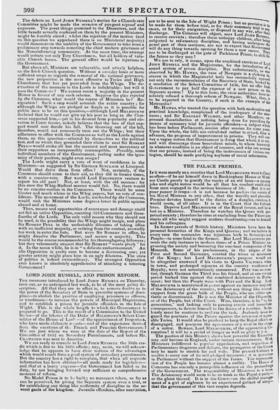THE PALACE PREMIER.
IF it were merely as a courtier that Lord MELBOURNE went to Cosa so often—if he sat himself down in Buckingham House or Wind. sot Castle purely to gratify the vanity of an old beau—a passing joke and slight notice would be all that his conduct could elicit from men engaged in the serious business of life. But it is not pour passer le temps—it is not because he prefers the soden of his Royal Mistress to any other, that the worldly and plausible Premier devotes himself to the duties of a dangler, careless, it would seem, of all other. It is its the Court that the Cabinet lives. Deprive Lord MELBOURNE of the Royal favour, and he is lost as a Minister. Therefore he watches the Queen with per- petual anxiety ; therefore he aims at excluding from the Palace pre- cincts all who might suggest matters disadvantageous to himself and his colleagues.
In former periods of British history, Ministers have been the personal favourites of the Kings and Queens; and we believe in every case the connexion was injurious both to Sovereign and People—in some fatal to the former. But Lord MELBOURNS pre- sents the only instance in modern times of a Prime Minister en- grossing the society and becoming the constant companion of the Monarch. Some of his predecessors, in the reigns of the First and Second GEORGES, courted the wives or mistresses of the Kings; but Lord Messougtex's purpose would not be altogether answered if his visits to Queen VICTORIA sties in town, and prolonged sojourns at the country residences of Royalty, were not ostentatiously announced. Pin was no cour- tier, though GEORGE the Third was his friend, and at one ethical period backed him against the combined Aristocracy in Polio. ;tient; but then the People were with PITT and the King. Lord MELBOURNE is maintained in power against an immense tuajority of the Aristocracy of the country, without any thing like earnest support from the great bulk of the People, who are either apt- Thetic or discontented. He is nut the Minister of the Oligarch!, or of the People, hut of the Court. Wise, therefore, is he "intus generation," and looking only to passing events and immediate consequences, to devote himself to the duties of a courtier. Solie lonely must he continue to perform the task. Jealously must be guard the precincts of the Palace against the intrusion ()f agree. able Tories. It would also be prudent to keep the Royal affecnas disengaged, and postpone the appearance of a rival in the shape of a suitor. Beware, Lord MELBOURNE, of the approaching Co- ronation! it will be a period of danger as well as glory to
The position of this Ministry shows how powerful the Executive may still become in England, under certain circumstances. Walt Ministers indifferent to popular approbation, and regarilless of Parliamentary disgraces and defeats, the prerogative of the Crown may be made to stretch far and wide. The present Cabinet s unable to carry one of its self-pledged measures : it is powerless in Parliament without the support of the Tories. The representa- tion of the People has become almost a nullity. The Helen d Commons has scarcely a perceptible influence on the proceedings of the Government. The responsibility of Ministers is a lame. The Aristocracy would seem to be as weak as the Popular part} or the ghost thereof. It is in the Court—on the skilful manage- ment of a girl of eighteen by an experienced gallant of sixty
that the government of this vast empire depends.


























 Previous page
Previous page